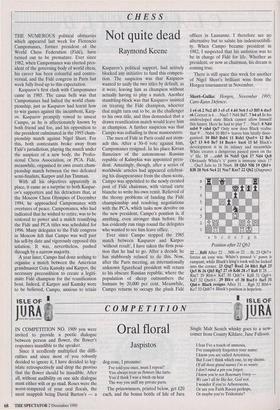CHESS
Not quite dead
Raymond Keene
THE NUMEROUS political obituaries which appeared last week for Florencio Campomanes, former president of the World Chess Federation (Fide), have turned out to be premature. Ever since 1982, when Campomanes was elected pres- ident of the governing body of world chess, his career has been colourful and contro- versial, and the Fide congress in Paris last week fully lived up to this expectation.
Kasparov's first clash with Campomanes came in 1985. The casus belli was that Campomanes had halted the world cham- pionship, just as Kasparov had learnt how to win games against the incumbent, Karp- ov. Kasparov promptly vowed to unseat Campo, as he is affectionately known by both friend and foe, and his opposition to the president culminated in the 1993 cham- pionship match against Nigel Short. For this, both contestants broke away from Fide's jurisdiction, playing the match under the auspices of a new body, the Profes- sional Chess Association, or PCA. Fide, meanwhile, organised its own ersatz cham- pionship match between the two defeated semi-finalists, Karpov and Jan Timman.
With all his objectives apparently in place, it came as a surprise to both Kaspar- ov's supporters and his detractors that, at the Moscow Chess Olympics of December 1994, he approached Campomanes with overtures of peace. Campomanes, who had indicated that he wished to retire, was to be restored to power and a match reunifying the Fide and PCA titles was scheduled for 1996. Many delegates to the Fide congress in Moscow felt that Campo was well past his sell-by date and vigorously opposed this solution. It was, nevertheless, pushed through by a narrow majority.
A year later, Campo had done nothing to organise a match between the American grandmaster Gata Kamsky and Karpov, the necessary precondition to create a legiti- mate Fide champion for the reunification bout. Indeed, if Karpov and Kamsky were to be believed, Campo, anxious to retain Kasparov's political support, had actively blocked any initiative to fund this competi- tion. The suspicion was that Kasparov wanted to unify the two titles by default, as it were, leaving him as champion without actually having to play a match. Another stumbling-block was that Kasparov insisted on treating the Fide champion, whoever that might turn out to be, as the challenger to his own title, and thus demanded that a drawn reunification match would leave him as champion. A further suspicion was that Campo was colluding in these manoeuvres.
The men of Fide in Paris could not stom- ach this. After a 30-0 vote against him, Campomanes resigned. In his place Kirsan Ilumzinov of the autonomous Russian republic of Kalmykia was appointed presi- dent. Amazingly, though, after a series of worldwide articles had appeared celebrat- ing his disappearance from the chess scene, Campo was appointed to the newly created post of Fide chairman, with virtual carte blanche to write his own remit. Relieved of the thorny problems of funding the Fide championship and resolving negotiations with the PCA, which tasks now devolve on the new president, Campo's position is, if anything, even stronger than before. He has evidently run rings round the delegates who wanted to see him leave office.
Ever since Campo stopped the 1985 match between Kasparov and Karpov `without result', I have taken the firm posi- tion that he had to go. After a decade he has stubbornly refused to do this. Now, after the Paris meeting, an internationally unknown figurehead president will return to his obscure Russian republic, where the population of sheep outnumbers the humans by 20,000 per cent. Meanwhile, Campo returns to occupy the plush Fide offices in Lausanne. I therefore see no alternative but to salute his indestructibili- ty. When Campo became president in 1982, I suspected that his ambition was to be in charge of Fide for life. Whether as president, or now as chairman, his dream is coming true.
There is still space this week for another of Nigel Short's brilliant wins from the Horgen tournament in November.
Short-Gulko: Horgen, November 1995; Cam-Kann Defence.
I e4 c6 2 Ne2 d5 3 e5 c5 4 d4 Nc6 5 c3 Bf5 6 dxc5 e6 Correct is 6 ... Nxe5 7 Nd4 Bd7. 7 b4 a5 In his undeveloped state Black cannot allow himself this luxury. Here he had to play 7 ... Nxe5. 8 Nd4 axb4 9 cxb4 Qc7 Only now does Black realise that 9 ... Nxb4 10 Bb5+ leaves him fatally disor- ganised. 10 Bb5 Bxbl 11 Rxbl Qxe5+ 12 Be3 Qc7 13 0-0 Bel 14 Bxc6+ bxc6 15 b5 Black's development is in its infancy and meanwhile White creates a dangerous passed pawn on the 'c' file. 15 ... cxb5 16 NxbS Qc6 17 Nd4 Qc8 Obviously White's 'c' pawn is immune since 17 Qxc5 fails to 18 Nxe6. 18 Qb3 Nf6 19 QbS+ KIN 20 Nc6 Ne4 21 Nxe7 Kxe7 22 Qb2 (Diagram) 22 ...Rd8 After 22 ...Nf6 or 22 ...f6, 23 Qb7+ forces an easy win. White's passed 'c' pawn is rampant, while Black's king's rook will be locked into the corner. 23 Qxg7 Rxa2 24 Rfc1 Rg8 25 Qe5 f6 26 Qh5 Rg7 27 c6 Kd6 28 c7 Ra8 If 28 ... Rxc7 29 Rb6+ Kd7 30 Qxh7+ Kd8 31 Qg8+ Kd7 32 Qxe6+. 29 Bf4+ e5 30 Bxe5 + fxe5 31 Qh6+ Black resigns After 31 ...Rg6 32 Rb6+ Ke7 33 Qxh7+ Black's position is hopeless.










































































 Previous page
Previous page